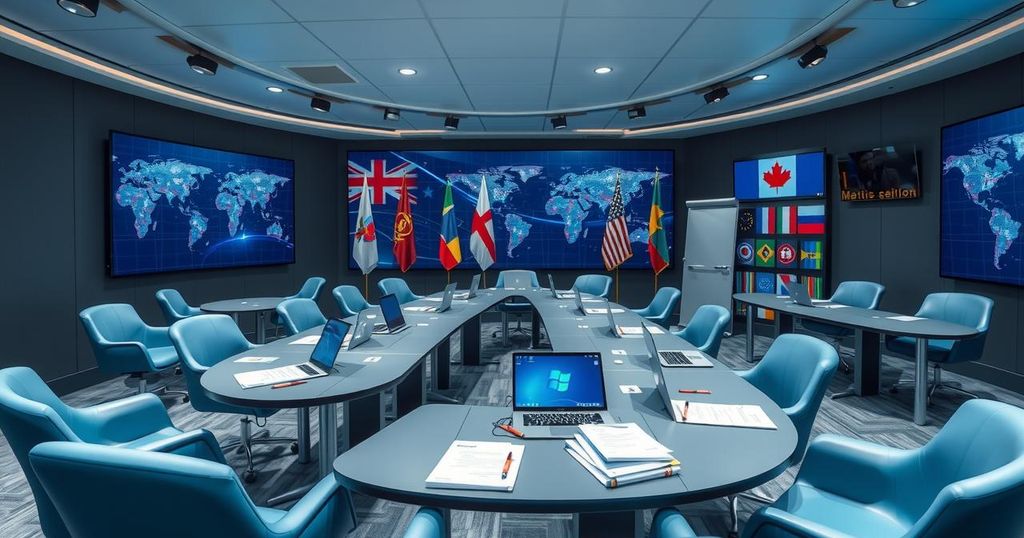US-Russia and US-Ukraine Talks in Saudi Arabia: An Analysis of Recent Negotiations

Recent negotiations in Saudi Arabia focused on a potential ceasefire in Ukraine, involving separate meetings between US, Ukrainian, and Russian delegations. While no joint statements were released, discussions centered on energy infrastructure security and Black Sea maritime issues. Both sides offered varied perspectives, with the US expressing optimism for future developments regarding the ceasefire.
Over three days in Saudi Arabia, US-Russia and US-Ukraine negotiations focused on establishing a potential ceasefire in Ukraine. Separate meetings were conducted between the US with Ukrainian and Russian delegations, yet no joint statements were issued, although parties disclosed discussion details. This article analyzes key points from the talks, perspectives from Ukraine, comments from Russia, and the US evaluation of the negotiations.
The negotiations occurred between March 23-25, 2023, with two rounds involving the Ukrainian delegation on March 23 and 25, and one session with Russia on March 24. The Russian talks lasted approximately 12 hours. Unlike earlier negotiations, technical teams, rather than political leaders, were present in Riyadh, forming the core of the discussions. The Ukrainian team, led by Defense Minister Rustem Umerov, included advisors in various sectors, while the US delegate contingent consisted of National Security and State Department officials. Russia’s delegation was represented by senior officials from the Federation Council and FSB.
Discussions focused on a US proposal for a temporary ceasefire, addressing issues such as halting attacks on energy infrastructure and reinforcing maritime security in the Black Sea, particularly targeting ceasefire measures at ports. Previous negotiations initially offered a 30-day ceasefire, which Ukraine accepted while Russia agreed to a temporary pause in targeting energy sites and sought to reinstate the Black Sea Initiative.
In the first negotiation round, lasting about five hours, critical issues in Ukraine’s energy sector and security for shipping in the Black Sea were discussed. Defense Minister Umerov highlighted the importance of Ukrainian dominance in the region for shaping the peace process, with conditions hinging on Russia’s goodwill to cease hostilities. A subsequent meeting on March 25 allowed feedback to be relayed to the Americans based on prior Russian discussions.
Outcomes from the lengthy US-Russia negotiations were initially expected to produce a joint statement; however, Kremlin spokesperson Dmitry Peskov announced no such document would be released, citing the technical nature of the talks. Peskov remarked that the results were presented to leadership in both Moscow and Washington for analysis. Contrarily, Russian officials suggested Ukraine’s position hindered any joint statement’s approval without disclosing specifics. Foreign Minister Sergey Lavrov emphasized Russia’s desire for clarity in restoring the Black Sea Initiative.
The US has refrained from commenting directly on the negotiations’ outcomes but expressed positive sentiments through media reports and unnamed officials. Progress was noted regarding the ceasefire proposal, and a forthcoming announcement is anticipated. The US aims to expand peace efforts in the Black Sea to resume commercial activities safely. Additionally, plans for further discussions on the ceasefire were noted with US National Security Advisor Mike Waltz intending to consult with Russian counterparts and the White House afterward.
The US-Russia and US-Ukraine negotiations in Saudi Arabia marked a crucial step towards addressing the conflict in Ukraine. Although the talks were technical with no joint statements issued, discussion points included a potential ceasefire and security in the Black Sea. Both Ukrainian and Russian representatives portrayed different perspectives on the talks’ efficacy, while the US maintained a cautiously optimistic stance, hinting at future announcements regarding potential agreements. The results of these discussions could shape the next phase of the conflict resolution process.
Original Source: newsukraine.rbc.ua







